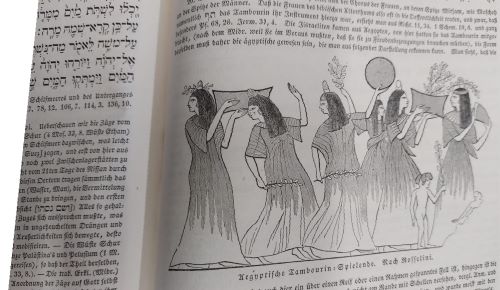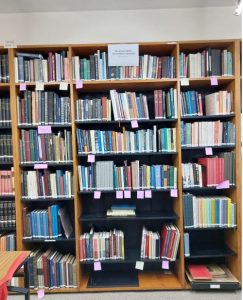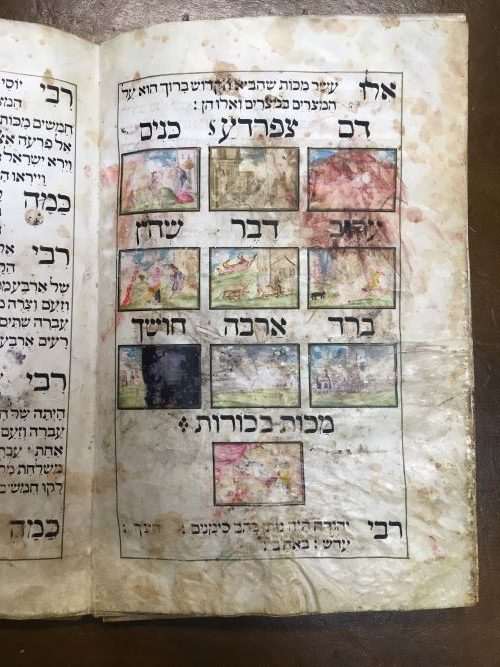Library of the Week: 27th February: We have a brilliant post this week written by the team at Leo Baeck College Library! Find out more about the history of the library, the Special Collections and rare books available as well as more about The Tunkel Collection. Thank you to the Library at Leo Baeck College for taking part.
The Leo Baeck College library was established in 1957, a year after the founding of the College. Originally located in the basement of a private house, in 1965 the library moved to the West London Synagogue where it was located in a purpose-built room. The library moved to its current location at the Sternberg Centre for Judaism in Finchley in 1982.
The original library collection was formed from a number of books that had been plundered by the Nazis and which were subsequently donated by the Society of Jewish Studies. These books had been stolen from synagogues, the library of the seminary in Breslau, the Hochschule in Berlin and private libraries of deported Jews.
From the outset, however, the intention of the Leo Baeck College Library was to combine this heritage collection with the need to provide rabbinic students with the books for their classes. The founding librarian, Jenny Doerfler, was the former librarian of the Hochschule für die Wissenschaft des Judentums in Berlin. She was succeeded by leading scholars who have always acted as scholar librarians. Since 2018, professional librarians have been employed, along with the long-standing and experienced cataloguers and volunteers already here.
Over the decades the library has expanded enormously thanks to purchases and generous donations. It now contains around 60,000 volumes as well as numerous periodicals and pamphlets. The library is one of the largest Jewish Studies libraries in Europe with some collection areas not covered by any other library. For example, in the fields of Progressive Judaism, Jewish Liturgy and Jewish Education, to name but a few. The LBC library contains many sources not available in many other libraries.
Our Special Collections include unique, rare and specialist material that reflects the richness and diversity of Jewish History, Culture and Thought.
We welcome visitors and SCONUL students; however, this is a members’ library and we encourage membership, which is open to anyone. We have requests for information from all over the world and we are happy to help with research and requests, if possible.

The librarian ensures that students, faculty and users are able to locate the resources needed for work and study, and will purchase necessary items for users. The librarian organises inductions for new students and faculty as well as running termly Library Committee Meetings where we hear feedback from student and faculty users and update members on current library events. I am the maternity cover librarian until mid-2023, so have been finding my way with the help of excellent handover information and helpful colleagues. It is helpful for the librarian to read Hebrew; I do, but I am certainly not a Hebrew language expert. This is the first job I have had with an English/Hebrew keyboard and it takes some getting used to. Probably by the time this contract is fulfilled, I will be used to it!
A sample of rare books at LBC Library
Die Israelitische Bibel edited by Ludwig Philippson, Baumgartner, Leipzig 1844
Ludwig Philippson was a Reform Rabbi who wanted to create a new, specifically Jewish translation and commentary, synthesising his own ideas and traditional Jewish exegesis with contemporary biblical disciplines, especially archaeology, geography, Egyptology, and botany. His translation is presented in Gothic Blackletter German characters and his German language commentary is abundantly illustrated with scenes, specimens and diagrams drawn from the scholarship that so excited him. In the photo below,

the bible is open to Miriam the Prophetess and her women dancing with their timbrels following the crossing of the Red Sea, illustrated with an image of Egyptian women. His work helped readers to imagine the biblical narratives in their historical context as well as examine the text in the vernacular.
The Tunkel Collection (in progress)
In late June 2022, after many years of discussion and planning, the LBC Library finally took possession of the first lot of the late Victor Tunkel’s Jewish music library, of which there are approximately 1,400 items, including rare books, serials and sheet music. This is the largest private Jewish music collection in the UK, if not Europe.

We currently possess about 500 Tunkel books in the library, most of which have now been catalogued under a classification system devised in-house; this is split into two main sections, Music and Musicology, then many sub-sections under those main headings. The collection has everything from Yiddish folk songs to Anthologies to Cantillation, and covers a wide-ranging area of topics within Jewish music. The remainder of the items will be arriving at the library in early 2023, and it is an honour for LBC Library to be named as the host of this unique Jewish music collection.
We will also be in receipt of a keyboard for students and musicians to use (with headphones) to sample the music selection. We hope to publicise this superb acquisition with events and invite musicians and scholars in to make use of the Tunkel Collection when it is fully catalogued and ready for visitors.
My favourite item: Herlingen Haggadah
This haggadah is small and perfectly formed. It is contained in its own protective box, made with marbled paper. The illustrations are colourful, tiny and beautiful. It is almost unbelievable that this book was made by one person. Aaron Herlingen (c1700-1760) was an Austrian scribe and illuminator. He was a prolific Jewish manuscript artist and was especially gifted as a calligrapher. When Herlingen was about 30 years old, he was selected as the scribe to the Imperial Library in Vienna. He was very proud of this appointment and noted this on many of his manuscripts’ title pages. Herlingen also produced work in Latin and other languages.

Most of this content has been pre-written by Cassy Sachar (Senior Librarian currently on maternity leave). Some has been written by Julie Feiler (maternity cover).
All images copyright of Leo Baeck College, reproduced with kind permission of the copyright holder.
You can explore the library’s collections on Discover and find further contact details on their Discover information page.

